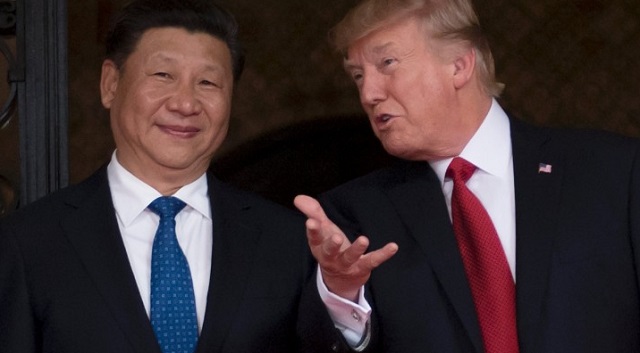The following article, The Great Wall of Debt: How 40 Chinese Banks Vanished, was first published on The Black Sphere.
President Trump’s tariff policy works. But if you’re waiting for the fake news media to explain, don’t hold your breath.
China had 40 Banks Go under in one Week!
The truth is coming out, President Trump was right with his dealings on Chinapic.twitter.com/S8wW86NKYO
— G-PA (@IndianaGPA) May 8, 2025
As the market rebounds in America from the Left’s attempted takedown of President Trump on tariffs, 40 Chinese banks disappeared in a single week. That’s not just a financial hiccup—it’s a full-blown coronary.
The Economist reported that 36 of these vanished banks were absorbed by Liaoning Rural Commercial Bank, a move that’s less about economic strategy and more about sweeping problems under the rug. China’s preferred method of handling struggling banks is to “absorb” them—a sanitized way of saying, “Erase the evidence and hope no one notices.”
Still, according to reports, 3,800 financial institutions now teeter on the edge, representing 13% of China’s banking system and holding a jaw-dropping 55 trillion yuan ($7.5 trillion) in assets. That crack may be too wide to patch.
This financial domino effect is tied to China’s real estate market, which has been stumbling under the weight of its own inflated promises. Many of these banks were knee-deep in lending to developers and local governments, making their portfolios about as stable as a house of cards in a wind tunnel. In some cases, up to 40% of their portfolios are non-performing loans—a polite term for money that’s probably never coming back. China’s situation certainly brings to mind the financial bubble of 2008 in America.
The timing of Trump’s response to China’s ongoing trade war with America couldn’t be worse.
China’s debt-to-GDP ratio is among the highest for developing nations, soaring by 45% over the past five years. Beijing’s solution? Increase exports. But Trump’s tariffs, some climbing as high as 145%, have thrown a wrench into that plan.
Chinese manufacturers, who once flooded the U.S. with cheap goods, are now fleeing their own backyard. Factories that laughed all the way to the bank are now setting up shop in Dallas, Houston, and Reno—not because they’ve developed a love for BBQ and cowboy hats, but because survival demands it.
Ryan Zhou, who runs a novelty gift business in eastern China, is setting up in Dallas.
“The United States accounts for nearly 95% of our orders. It’s not a market we can afford to lose,” he told the South China Morning Post.
Leo Li is following suit, opening a sensor module assembly plant in Nevada, admitting that rising costs stateside are still cheaper than Trump’s tariffs. These aren’t American companies returning home; they’re Chinese firms jumping ship.
And the exodus is far from over.
Zhu Ning, a consultant who advises Chinese companies on relocation, reported that he’s handled over 100 inquiries in the last four months—a migration wave Beijing’s propaganda machine is hilariously branding as “strategic expansion.” But there’s nothing strategic about running for cover.
Meanwhile, China’s leadership is playing coy, pretending like trade talks with the U.S. are some kind of charity case.
According to CNBC, they’re “evaluating” the possibility of talks, as if Trump’s tariffs haven’t already sent their economy into survival mode. Dan Wang, China director at Eurasia Group, called Trump’s unpredictability a roadblock to negotiation.
“The negotiation is difficult to start because Trump is chaotic,” Wang said.
Chaotic? No, unpredictable. And in deal-making, unpredictability is a weapon.
The U.S. imported $395 billion worth of goods from China in 2024 alone. That’s not just a revenue stream; it’s Beijing’s lifeline. Losing access to that market—or even just a chunk of it—is an economic migraine China can’t afford. Property bubbles, youth unemployment, and a shaky banking system are just the appetizers to a main course of financial instability.
While China’s state-run media tries to save face, Trump’s tariffs are rewriting the rules. Every Chinese factory that packs up and moves to U.S. soil is a chisel hitting the Great Wall of Debt. Beijing might flex and posture, but it’s all for show. The real story is written in the flight of its manufacturers.
Negotiations are coming, but they won’t be pretty.
Beijing will beg for tariff rollbacks, but Trump’s not exactly known for handing out charity. Alfredo Montufar-Helu of The Conference Board’s China Center stated that both sides will be reluctant to make concessions. But here’s the kicker—Trump holds the cards. And Beijing knows it. Despite the bluster, China’s leaders are staring down an economic cliff, and they don’t have a parachute.
So here’s to the Chinese firms setting up shop in Dallas and Reno. They’re not just dodging tariffs; they’re waving a white flag. Trump’s tariffs aren’t just a trade policy—they’re a reckoning. And Beijing’s got no snooze button. Pull up a chair, China. The negotiation table’s ready, and this time, you’re coming empty-handed.
Continue reading The Great Wall of Debt: How 40 Chinese Banks Vanished …


